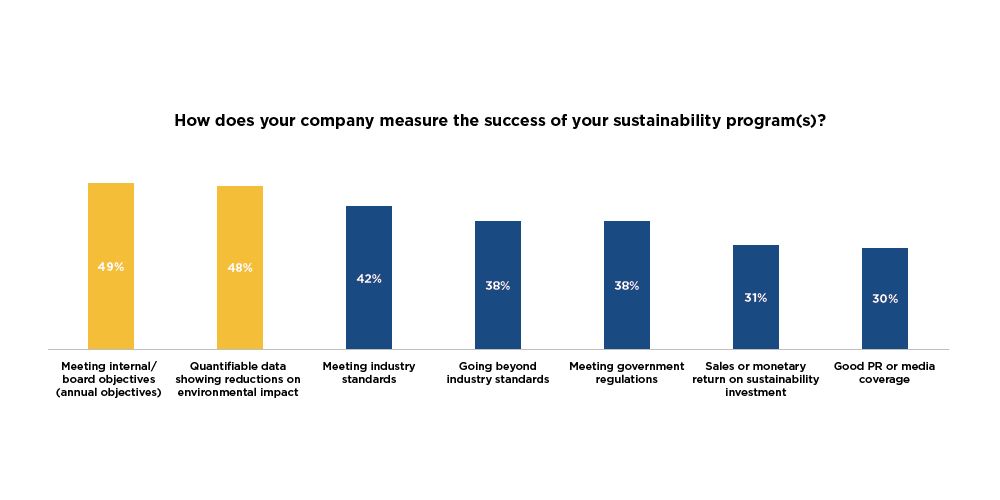It is no surprise that sustainability has become a hot topic among brands and retailers. In a recent survey of European and North American brands and retailers, 80% responded that sustainability is important within their organizations and 75% say their focus on sustainability has increased in the past year. But as the emphasis on sustainability has grown, the definition of sustainability has evolved and what brands and retailers need from a sustainability standard has subsequently changed.
Brands and retailers are no longer looking at sustainability initiatives as simple marketing tools used to attract customers with feel-good messaging. In fact, in a recent survey conducted by H&K Strategies, less than one-third of brand and retailer sustainability employees reported that they pursue sustainability programs for good PR or media coverage (30%).
Sustainability is now so entrenched in corporate strategy that it has become a key component of brand identity, which has shifted how brands and retailers measure their own sustainability progress.
According to the survey respondents, for sustainability standards to be successful, they need to help companies meet not only internal objectives (50%), but industry standards as well (42%) and should provide quantifiable data showing a reduction in environmental impact (48%). The U.S. Cotton Trust Protocol®, a new standard for sustainably grown cotton, can help brands and retailers achieve those objectives.

U.S. Cotton Trust Protocol
The U.S. Cotton Trust Protocol, aligned with the U.N’s Sustainable Development Goals, builds upon an existing commitment to sustainability among U.S. cotton producers. Over the past 35 years, U.S. cotton production has used 79% less water per bale and 54% less energy, reducing greenhouse gas emissions by 40%, all while reducing land use per bale by 49%.
The adoption of practices such as precision agriculture has further improved soil health, reducing loss and erosion by 37% per acre and increasing soil carbon levels. The U.S. Cotton Trust Protocol further strengthens the U.S. cotton industry’s sustainability record through field-level data collection and third-party verification of farmers’ sustainability practices.
The U.S. Cotton Trust Protocol has now been accepted and placed on the list of preferred fibers by leading sustainability organizations in the textile and apparel industry including the Textile Exchange, Cotton 2040, and the Sustainable Apparel Coalition. With over two-thirds of the brand and retailer survey respondents reporting they refer to industry lists of sustainable fabrics for their sourcing decisions, choosing the U.S. Cotton Trust Protocol is an easy decision that will help them align with industry standards.
The U.S. Cotton Trust Protocol will also provide brands and retailers with the assurances they need, through quantifiable and verifiable data, that the fiber they are using in their products is among the most sustainably grown in the world.
Brand and retail members of the U.S. Cotton Trust Protocol will have access to farm-level data showing year-over-year improvement in six key sustainability metrics. Proven via Field to Market, measured via the Fieldprint® Calculator, and verified by Control Union, an independent third-party verification company, this data allows brands and retailers to measure their own progress towards internal objectives as well as communicate their sustainability commitments to customers.
The U.S. Cotton Trust Protocol is not only positioned to meet the current requirements brands and retailers are looking for in a sustainability standard, but future needs as well. The question of what it means to be a sustainable organization has changed. Supply chain management and traceability will be crucial for brands and retailers in the future and the U.S. Cotton Trust Protocol is a tool that can help them do just that.
Traceability Throughout the Supply Chain
More than half of the brands and retailers surveyed said they are either asking their suppliers to trace cotton through the supply chain and/or relying on the use of blockchain and other technology. The U.S. Cotton Trust Protocol can help brands and retailers gain unparalleled supply chain transparency through its Protocol Credit Management System (PCMS) and its partnership with TextileGenesis™, a platform built to track materials for the fashion and textile industry throughout the supply chain.
The platform records and verifies the movement of U.S. cotton fiber through the entire production process giving brands and retailers greater insight into their own supply chain. Combined with access to over three hundred mill and manufacturer members in over twenty-five different countries that have already signed up for the program, the U.S. Cotton Trust Protocol delivers brands and retailers greater access and control over their own supply chains than ever before.
There has never been a greater expectation for sustainability and transparency, but when it comes to choosing a sustainability standard, brands and retailers have a long and growing list to choose from. When they choose the U.S. Cotton Trust Protocol, not only are brands and retailers able to meet industry standards for sustainability, but with unmatched access to and supply chain transparency, they will exceed them.
















